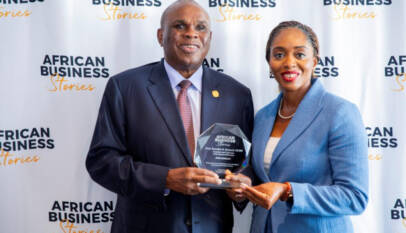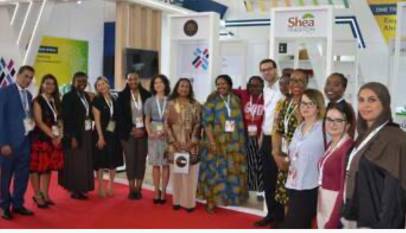Solar-Powered Technologies Spark Climate-Smart Farming for Women in Adamawa
In Adamawa, northeast Nigeria, the introduction of solar-powered mechanized tools is reshaping women’s roles in climate-smart agriculture—empowering them with independence, income, and the ability to provide for their families.

For 35-year-old Theresa Wonosaro, the ache in her shoulders from pumping a manual pesticide sprayer was a daily reminder of her farm’s losing battle against pests. Season after season, she watched in frustration as insects devoured the crops she had painstakingly nurtured. Despite her determination, the back-breaking sprayer simply could not keep pace with the relentless pest attacks.
A mother of five and smallholder farmer in Demsa Local Government Area of Adamawa State, Wonosaro cultivates rice, sorghum, soya beans, and millet. For years, pests remained an unyielding challenge, and her manual sprayer made it nearly impossible to cover her 1.5-hectare farm without suffering severe stress and physical strain.
Owning a sprayer was beyond her means, while renting from agents came with its own frustrations—she often had to stop midway when owners demanded the equipment back, sometimes even trailing her to the farm to retrieve it. The struggle extended to her household as well; her husband’s farm faced similar setbacks, deepening the family’s hardship.
“Last year, when my children were returning to school, I worked myself to exhaustion on the farm, praying for a miracle harvest. Then the calls started: ‘Mommy, send money, I’m hungry.’ With nothing to give, I turned to loans, hoping the farm would yield enough to repay them.
“One afternoon, I tried to spray the whole farm, but by 5 p.m. the owners came to collect the sprayer. For the next week, I couldn’t access it because other farmers had booked it. I resorted to using my hoe to fight weeds—sometimes injuring my crops, other times leaving weeds because my back was too sore.
“Renting a sprayer for ₦2,000 for just a few hours left me drained, yet the harvests never improved. I realized it was safer to protect my health than to risk falling ill and spending borrowed money on hospital bills,” Wonosaro narrated her ordeal to African Newspage.
The back-breaking labor soon became a source of concern for her husband, who urged her to abandon farming altogether. The dream of a bumper harvest felt increasingly out of reach—until the arrival of Propcom+-supported Women in Mechanized Agriculture (WIMA). The initiative guarantees women farmers access to modern farming equipment and services, offering Wonosaro not just relief from the strain but a renewed sense of hope.
Propcom+, an eight-year UK Foreign, Commonwealth and Development Office (FCDO)-funded rural and agricultural market development programme, supports Climate-smart Agriculture (CSA) and green growth in Nigeria. It promotes innovative technologies and business models that help smallholder farmers increase productivity while building resilience to climate change.

Propcom+ CSA Models: Integrating Technology and Business for Impact
Thanks to Propcom+ catalytic CSA technologies, solar-powered agri-mechanisation tools are helping Adamawa farmers like Wonosaro keep pace with the shift to climate-smart agriculture. By replacing costly, inefficient manual sprayers with solar-powered alternatives, smallholders can now farm larger areas, cut pest-related losses, and save money that once drained their profits.
“This solar-powered pesticide sprayer didn’t just save me time—it transformed my harvest. Before, I managed only 15–19 bags, but now I get nearly 100 bags. I’ve cleared my debts, and my husband fully supports my farming because it no longer threatens my health.
“Previously, I rented manual sprayers for ₦1,000– 2,000, and the owners would rush me to return them. With WIMA, I rent for just ₦500, and I can even keep the sprayer overnight without extra charges. That freedom has changed everything,” Wonosaro said with joy.

Breaking Free from Costly Irrigation
The removal of Nigeria’s fuel subsidy in 2023—and the resultant surge in petrol prices—made irrigation farming prohibitively expensive for smallholder farmers. For 42-year-old Aniya Ibrahim, who grows the same crops as Wonosaro, keeping her fields watered during the dry season became a painful struggle.
She spent over ₦24,000 just to fuel a rented petrol-powered water pump. Farming was her only means of survival, yet the soaring cost of irrigation pushed her family to the brink. “At times, I could only watch helplessly as my crops withered for lack of water. I kept hoping for relief but didn’t know when it would come,” she told African Newspage.
Ibrahim’s fortunes turned when WIMA introduced solar-powered irrigation solutions. “Before, I spent ₦24,000 on fuel. Now, renting a solar-powered water pump costs just ₦3,000. God has blessed Adamawa with abundant sunshine, and now we are using it to power our farms. My life has truly changed, and so has our community,” she said with a sense of relief.
Ummi Gaya, Coordinator of WIMA in Adamawa State, says the success of mechanization in Demsa is only the beginning. She noted that their services now extend to surrounding communities and five additional LGAs. Since its inception, WIMA has engaged over 1,000 people, with women accounting for more than 70% of beneficiaries across the state.
The WIMA initiative began with awareness campaigns, where community members were introduced to how the machines work, the benefits of mechanization, and their potential to transform farming. To ensure sustainability, mechanized service providers were organized into cooperatives responsible for managing the equipment, mastering its operation, and raising awareness in nearby communities. This model not only fostered ownership but also encouraged women to take on active roles in mechanized farming.
“Before mechanization, many women struggled with the physical burden of farming, and some had even abandoned it. At first, men took the lead, but once women saw how much easier it made their work, they stepped forward in large numbers. Propcom+ has been instrumental—providing technical support, tools, and training. Their backing has helped us empower women and transform farming in our communities,” Gaya said.

Relief for Men as Women Step Up
The benefits of mechanization extend beyond women, easing burdens on men as well. Ohel Swade, a community leader in Demsa, noted that husbands who once shouldered nearly all household responsibilities—covering school fees, food, and other family needs—now find relief as their wives contribute meaningfully to family sustenance.
This shift, he explained, has freed men to invest in small businesses and other ventures, reducing the cycle of constant financial strain.
“It has been fantastic. Solar-powered machines cut costs and make farming profitable again. Many young girls who once gave up have now returned to farming. Women can meet family needs on their own and are becoming true pillars in their households,” Swade said.
For young farmer Weigopwa Augustine, the introduction of solar-powered threshers completely transformed post-harvest work. “Before, we used sticks or stones to thresh, and sometimes lost nearly half our grains. By the time we finished, we were too exhausted to even take anything to the market to sell,” she recalled.
A Vision for Climate-Smart Transformation
Political Director and Country Representative of Propcom+ Dr. Adiya Ode say solar-powered mechanization under the Catalytic CSA Technology and Business Model not only reduces fuel costs but also tackles one of rural farmers’ biggest barriers—limited access to finance.
Dr. Ode says the programme’s interventions are designed to transform Nigeria’s rural economy through climate-smart agriculture. By 2030, Propcom+ aims to reach 3.79 million smallholder farmers and SMEs, with at least half being women or women-led enterprises.
“Our vision goes beyond food security—we are committed to environmental protection, stronger livelihoods, and resilience in the face of climate change. We adopt a market-systems approach, partnering with private actors and government institutions to strengthen agricultural value chains sustainably. Our focus is systemic change, not short-term fixes,” she explains.
In Demsa and beyond, the adoption of solar-powered pumps, threshers, and sprayers is proving to be more than an upgrade—it is a pathway to wealth creation. By reducing reliance on costly petrol-powered equipment, smallholder farmers are securing better harvests at lower costs while restoring hope for the future. The experiences of Wonosaro, Ibrahim, and Augustine underscore a powerful truth: with the right tools, farming can once again be profitable, sustainable, and dignified.
















